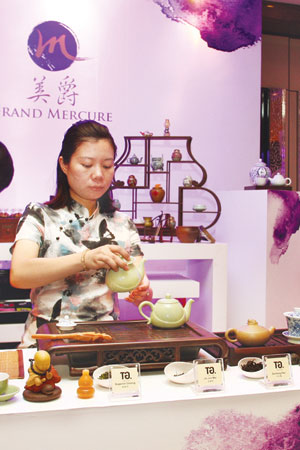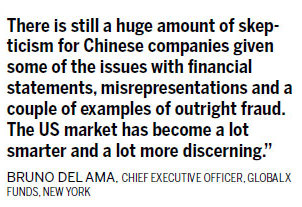 |
|
|
|
|||||||||||
Accor, Europe's largest hotelier, said it is hoping to further tap into China's upscale hotel market through the rebranding of its Grand Mercure hotels, tailored for Chinese clients.
The hotel giant also said it hopes to expand the number of Grand Mercure hotels in China to 65 by 2015, a first major step toward a more flexible and locally-relevant branding strategy in China. Currently it has about 10 Grand Mercure hotels in the country.
"Our ambition is to enhance our expansion internationally and particularly in high growth markets such as Asia - and particularly China, where the dynamic of the economy opens new frontiers in the hospitality sector," said Grgoire Champetier, Accor's global chief marketing officer.
 |
|
Chinese staff perform a tea ceremony at the inauguration of Grand Mercure Shanghai Zhongya hotel in Shanghai. The company is planning to offer traditional hotel products blended with Chinese local cultures.?[Photo/China Daily] |
Accor earlier this month launched the new Grand Mercure brand in Shanghai, offering its guests more services with Chinese elements such as daily tai chi sessions and more emphasis on Chinese cuisine, including a special 24-hour congee menu.
"The Grand Mercure (meijue in Chinese) is launched in the framework of our global project to modernize our brand portfolio. Our clients are now expecting our brands to be capable of understanding the diversity and complexity of their identity," said Champetier, adding that his company is "acutely aware of the opportunity that the significantly increasing number of sophisticated Chinese tourists creates for an unprecedented upscale hotel market in China".
With an international presence, Accor said it hopes to offer traditional hotel products blended with local cultures.
"In the hotel sector, one size doesn't fit all, and China deserves a very specific treatment," said Champetier.
According to the 12th Five-Year plan (2011-2015), the nation's total tourism revenue is expected to reach 2.5 trillion yuan ($397 billion) in 2015, accounting for 4.5 percent of gross domestic product. The blooming tourism industry had attracted more hotel giants to expand their investment and seek innovation in one of the world's largest tourism markets.
Statistics from the China National Tourism Administration show that by October 2011 China had a total of 2,123 four-star hotels and 578 five-star hotels, with Shanghai leading other places in terms of average room rate for five-star hotels, at 969.5 yuan a night.
The tourism administration also forecast that about 10,000 star-rated properties are expected to be completed in the country by 2015.
Industry analysts attribute China's hotel-building boom to the weak economies in Europe and the United States. Finding little room for growth in their traditional markets, global hotel chains are focusing their expansion on emerging market economies, particularly China.
"One particularly strong market is Shanghai," said Elizabeth Randall, managing director of hotel research company STR Global. The World Expo 2010 in Shanghai, which broke previous Expo attendance records, boosted Shanghai's revenue per available room (RevPAR), a key indicator of hotel performance, in the first nine months of 2010 by 64 percent from a year earlier, reaching $104.50.
Champetier said the hotel group is seeking to rebalance its revenue strategy to make income from Asia-Pacific and Latin America account for half of its global figure, from the current 40 percent, to maintain a steady development growth and increase its capacity in high-growth developing markets such as China in particular.
|
|
 |
|
|
"For China, it's clear that in a few years it will be the leading tourism market of the world. We are doing everything that we can, in terms of brands and organization, to develop the China market."
Accor is building another 10 Grand Mercure hotels in China, bringing its total in the country to 20, according to Sam Shih, chairman of Accor Great China. Sam said that he hopes that the tailor-made Grand Mercure will become one of the engines for Accor's future growth here.
Entering China in 1985, Accor currently operates seven brands including Sofitel, Pullman, Grand Mercure, Novotel and the economy hotel brand ibis in China. It also plans to quadruple its network in China by 2015 from the current 121 hotels it operates.
Shi Yingying in Shanghai contributed to the story